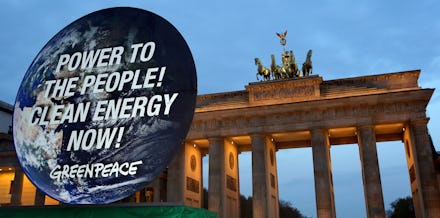This Country Leads the World in Clean Energy — And the U.S. Could Learn Something From It

The news: In the past nine months, Germany set an impressive new benchmark: For the first time, it got more electricity from renewable sources — 27.7% of total demand — than from any other source of energy.
By increasing dependence on wind, biomass and solar power, and creating storage for excess energy, Germany hopes to curtail its reliance on Russian natural gas, as well as reduce pollution, nuclear power use and electricity bills. German Chancellor Angela Merkel is pushing to get as much as 60% of the country's total energy demand from renewable sources by 2035, but the plan comes with a heavy cost.
It's been a success in many ways. Energiewende, or the Germany's transition to clean energy, has transformed the country's energy market in extraordinary ways in the span of just 10 years. On average, renewables can account for 31% of the country's electricity generation — on a very windy, sunny day that number can go as high as 74%.
Another important aspect is the focus on small business. More than half of Germany's renewable energy belongs in the hands of private citizens, 11% of whom happen to be farmers.
But success comes with a price tag. While news outlets such as Al Jazeera might be quick to claim that "Germany's energy model can save the world," skeptics might wonder whether the financial trade-off is worth it. According to Bloomberg, "private citizens, shopowners and companies paid 106 billion euros ($130 billion) since 2000 to finance the clean-energy expansion through a charge added onto their bills. Consumer power bills are the second-highest in the European Union."
And as Bloomberg View's Leonid Bershidsky points out, Germany is still dealing with high dependence on coal, sky-high electricity bills, consistent greenhouse gas emissions and an energy market with some serious kinks.
"This rapid growth skewed the market. Because of renewable energy's subsidized production cost, wholesale electricity prices have dropped 60% since 2008. That has made it unprofitable for traditional utilities to operate natural gas-burning power plants," Bershidsky writes.
But even Bershidsky admits that there is much to learn from "[t]he German government's determination to experiment, and citizens' continued willingness to pay for these experiments if they lead to a cleaner future." And he's right. Energiewende hasn't yielded perfect results, but it's allowed Germany to serve as an important case study for the rest of the world.